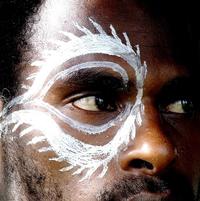I am currently involved in a proposed project on Age(ing) at the Weltkulturen Museum in Frankfurt, Germany to open in October 2018 for 11 months. ‘Age(ing)’ will be explored in all its dimensions across different world regions through photography, film and creative writing by scholars, artists and poets, as well as younger and older people from the general public.
One of the co-contributors to the project is Osborne Macharia, a Kenyan artist / photographer. He is an exponent of a genre called ‘Afrofuturism’, which in his words is “An artistic repurposing of the post-colonial African narrative through the integration of historical elements, present culture and future aspirations … using narrative, fantasy and fiction to highlight African identity”. He explores this through the medium of composite photography / videography to comment on historical and current narratives and social issues. Of particular interest to me is of course his imagery related to older persons, like the hip-hop grandfathers, extravagant grannies, and freedom-fighting opticians.
In his Magadi project, for example, he envisages four imaginary older female circumcisers who relinquished their harmful traditional practices. Instead they now offer education and their wisdom to the same young girls they would have mutilated. Through the fashion empire that they have established since they abandoned their harmful traditional practices, they now provide these girls with education in styling, fashion design, fabric printing and modelling, and an escape from early marriage.
These are imageries of reinvention on many levels: away from the intergenerational transfer of harmful traditional practices towards mentorship; positive change which is above all humorous, beautiful and interesting without the moral high ground; agency; new later life prospects…
Apart from the obvious visibility and prominence that these images afford (often invisible) older people in the youngest region of the world (arguably for the first time on this scale other than in a narrow research / policy / NGO context), these images are important for two further reasons among others:
- These imaginary images at last reflect some counter narratives of ageing in Africa
The generally implicit narrative about ageing in Africa risks to stereotype older people as uniformly disadvantaged. This is of course understandable against the backdrop of poverty and inequalities, rampant rural‒urban migration, and the quadruple burden of disease – not to forget changing family dynamics. It is, however, important to note that the continent is diverse and that Africa’s people grow older in a variety of settings with a range of disparities in capacity, privilege and power. Therefore, the heterogeneity of these populations as well as individuals should be acknowledged within and across communities and countries. That asks for a multiplicity of narratives and images.
- These imaginary images at least provide prompts for some alternative prospects
Afrofuturism, facilitates a process by which we could reimagine (or often, for the first time, imagine) the present in terms of the future, or at least contemplate alternative prospects as a possible roadmap for the future. Through speculative means, Afrofuturism reimagines new experiences and identities to deal with an unliveable present and a colonial (erased) past. In a way it is a crafting of the futures that we can control (see Dery, 1994 who coined the term Afrofuturism and on whom African exponents of Afrofuturism draw). Placing African older people in a futuristic landscape, such as those imagined by Osborne Macharia, subverts the often singular ‘traditional’ imagery that is usually associated with them and could prompt policy makers and practitioners to explore new insights.
If we are to grasp our contemporary moment so that it is more equitable, just and more humane, we must not only grapple with our histories but perhaps also craft our collective imagined futures …
About the Author
Dr. Jaco Hoffman is a Senior Research Fellow at the Oxford Institute of Population Ageing and co-ordinates the African Research Network on Ageing (AFRAN) and the Society and Environment Research Cluster.
Comments Welcome:
We welcome your comments on this or any of the Institute's blog posts. Please feel free to email comments to be posted on your behalf to administrator@ageing.ox.ac.uk or use the Disqus facility linked below.
Opinions of the blogger is their own and not endorsed by the Institute
Comments Welcome: We welcome your comments on this or any of the Institute's blog posts. Please feel free to email comments to be posted on your behalf to administrator@ageing.ox.ac.uk or use the Disqus facility linked below.













